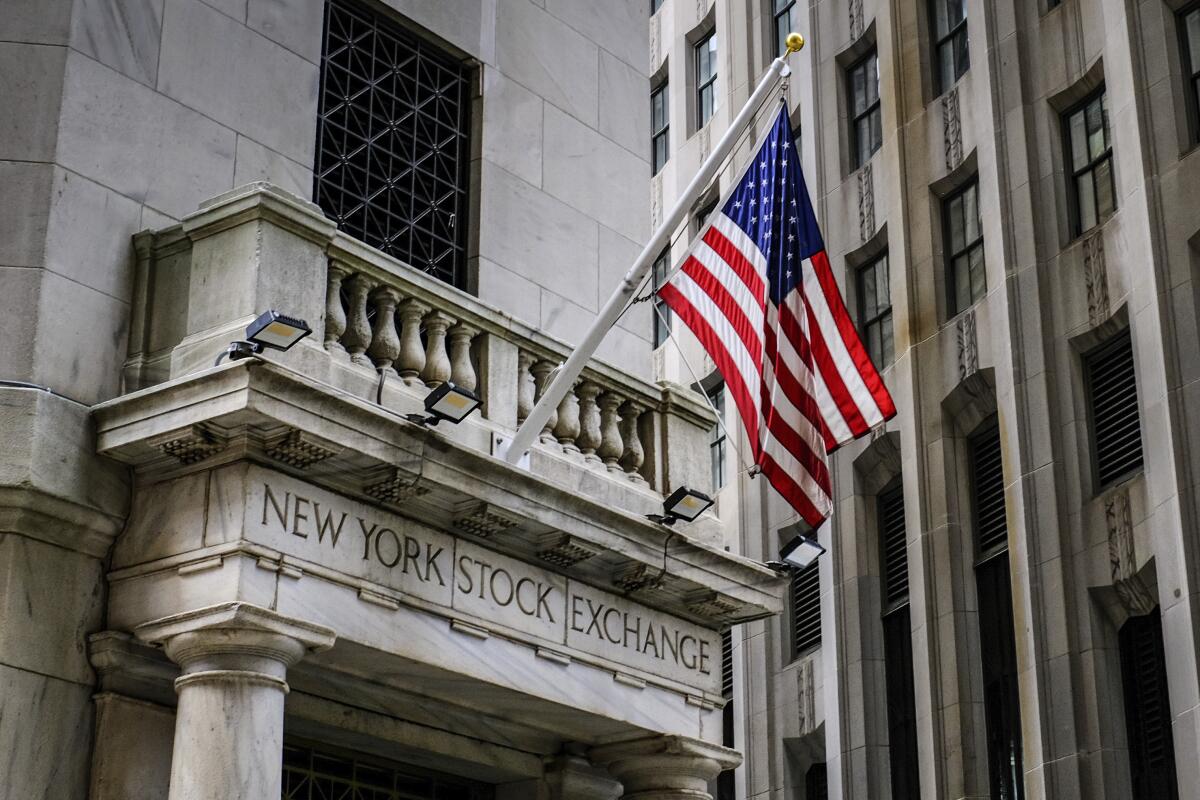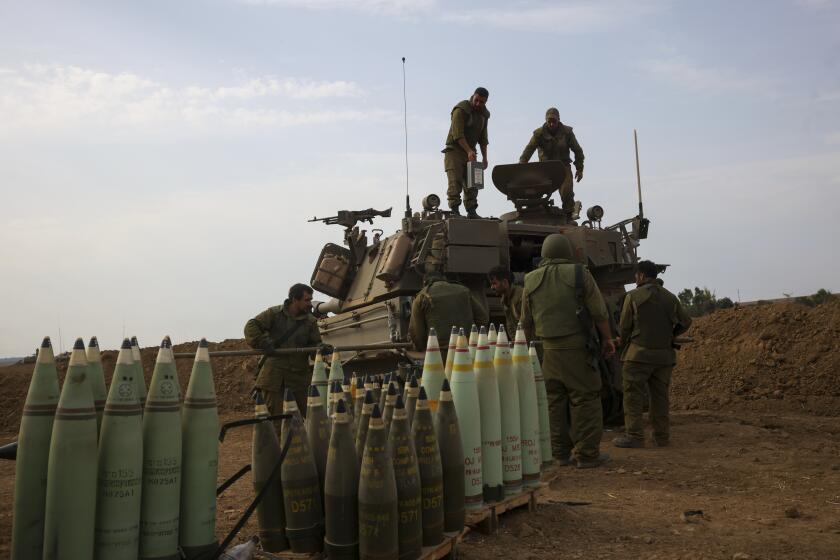Oil prices climb following the latest Gaza war, but stocks rise with rate hopes

- Share via
Oil prices climbed with worries about violence in the Middle East. The stock market was less fearful, though, and flipped from early losses to gains.
The Standard & Poor’s 500 index rose 27.16 points, or 0.6%, to 4,335.66, following some potentially encouraging news on interest rates, which have been dragging Wall Street mainly lower since the summer..
The Dow Jones industrial average gained 197.07 points, or 0.6%, to 33,604.65, and the Nasdaq composite climbed 52.90 points, or 0.4%, to 13,484.24.
Stocks perked higher after two officials at the Federal Reserve suggested they may not need to raise interest rates again at their next meeting Nov. 1, because a jump in longer-term bond yields may be helping to cool inflation without further market-rattling hikes by the Fed.
That gave stocks some oxygen and helped them erase modest losses from the morning. The S&P 500 had sagged by as much as 0.6% in its first trading after Hamas launched a surprise attack against Israel, which then formally declared war.
The area under conflict is not home to major oil production, but fears that the fighting could spill into the politics around the crude market sent a barrel of U.S. oil up $3.59 to $86.38. Brent crude, the international standard, rose $3.57 to $88.15 per barrel.
One potential outcome of the violence is a slowdown in Iranian oil exports, which have been growing this year, said Barclays energy analyst Amarpreet Singh. Less supply of crude would raise its price, all else being equal.
The conflict could also hurt the possibility of a potential improvement in relations between Israel and Saudi Arabia, which is the world’s second-largest producer of oil. Traders may be taking off some bets that Saudi Arabia would be willing to raise its oil output to help secure a deal on Israel with the United States, Singh said.
Israel battled Hamas infiltrators for a third day and massed tens of thousands of troops near the Gaza Strip after the biggest attack in decades on Israeli soil.
Oil prices already had been volatile leading into the weekend. A barrel of U.S. crude jumped from less than $70 during the summer to more than $90 last week, raising the pressure on inflation and the overall economy. It pulled back last week before jumping again after Hamas militants launched their cross-border attack in Israel.
Monday’s rise in crude helped oil and gas stocks to some of Wall Street’s biggest gains. Marathon Oil rose 6.6%, and Halliburton climbed 6.8%.
Stocks of defense contractors that make weapons were also particularly strong. Northrop Grumman rallied 11.4%, and L3Harris Technologies gained 10%.
On the opposite end were companies that count fuel as among their biggest expenses. United Airlines sank 4.9%, and Carnival fell 4.3%.
Urging restraint won’t work, given the scale of the Palestinian attacks. How far will further escalation go?
But it’s interest rates, and expectations for where they will go, that have been driving Wall Street’s swings more than anything since the start of last year.
With inflation still too high for policy maker’s liking, and the U.S. economy remaining in relatively solid shape, expectations have built on Wall Street that the Fed will keep its main interest rate high for longer than traders wanted.
The Fed has already hiked its overnight rate to the highest level since 2001, and it indicated last month that it may cut rates next year by less than earlier expected. With the Fed also continuing to shrink its trove of bond investments, the yield on the 10-year Treasury has jumped to its highest level since 2007.
Wall Street hates higher interest rates because they knock down prices for stocks and other investments. They also make it more expensive for all kinds of companies and households to borrow money, which puts the brakes on the economy.
The 10-year yield has climbed to 4.80%, up from 3.50% during the summer and from just 0.50% early in the pandemic. Trading in the U.S. Treasury market was closed Monday for a holiday.
Feelings of fear and helplessness gripped L.A.’s Jewish community after the deadliest attack in Israel in decades during what was supposed to be a weekend of celebration.
Philip Jefferson, vice chair of the Fed’s board and a close ally of Chair Jerome H. Powell, said in a speech Monday that he would “remain cognizant” of the higher bond rates and “keep that in mind as I assess the future path of policy.”
Lorie Logan, president of the Federal Reserve Bank of Dallas and a voting member of the Fed’s rate-setting committee, said in a separate speech that there may be less need to raise the Fed’s main interest rate if long-term rates stay high.
Reports this week on inflation at both the consumer and wholesale levels are the next big data points due before the Fed makes its next announcement on interest rates on Nov. 1.
This week will bring the unofficial start to earnings reporting season for the S&P 500, with Delta Air Lines, JPMorgan Chase and UnitedHealth Group among the big companies scheduled on the calendar.
In Israel, the country’s central bank said it will sell up to $30 billion in foreign exchange to prop up the shekel, whose value tumbled after the violence began. It also said it will provide up to $15 billion to support market liquidity.
The shekel was down 2.3% against the U.S. dollar and back to where it was in 2016.
Besides the U.S. dollar, another investment that usually does well in times of stress also rose. Gold added $19.10 to $1,864.30 per ounce.
In stock markets abroad, indexes were modestly lower in Europe and mixed in Asia. Stocks in Shanghai fell 0.4% after trading reopened following a weeklong holiday.
AP writers Matt Ott, Elaine Kurtenbach and Jon Gambrell contributed to this report.
More to Read
Inside the business of entertainment
The Wide Shot brings you news, analysis and insights on everything from streaming wars to production — and what it all means for the future.
You may occasionally receive promotional content from the Los Angeles Times.













